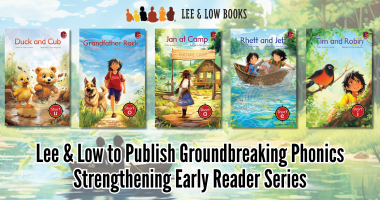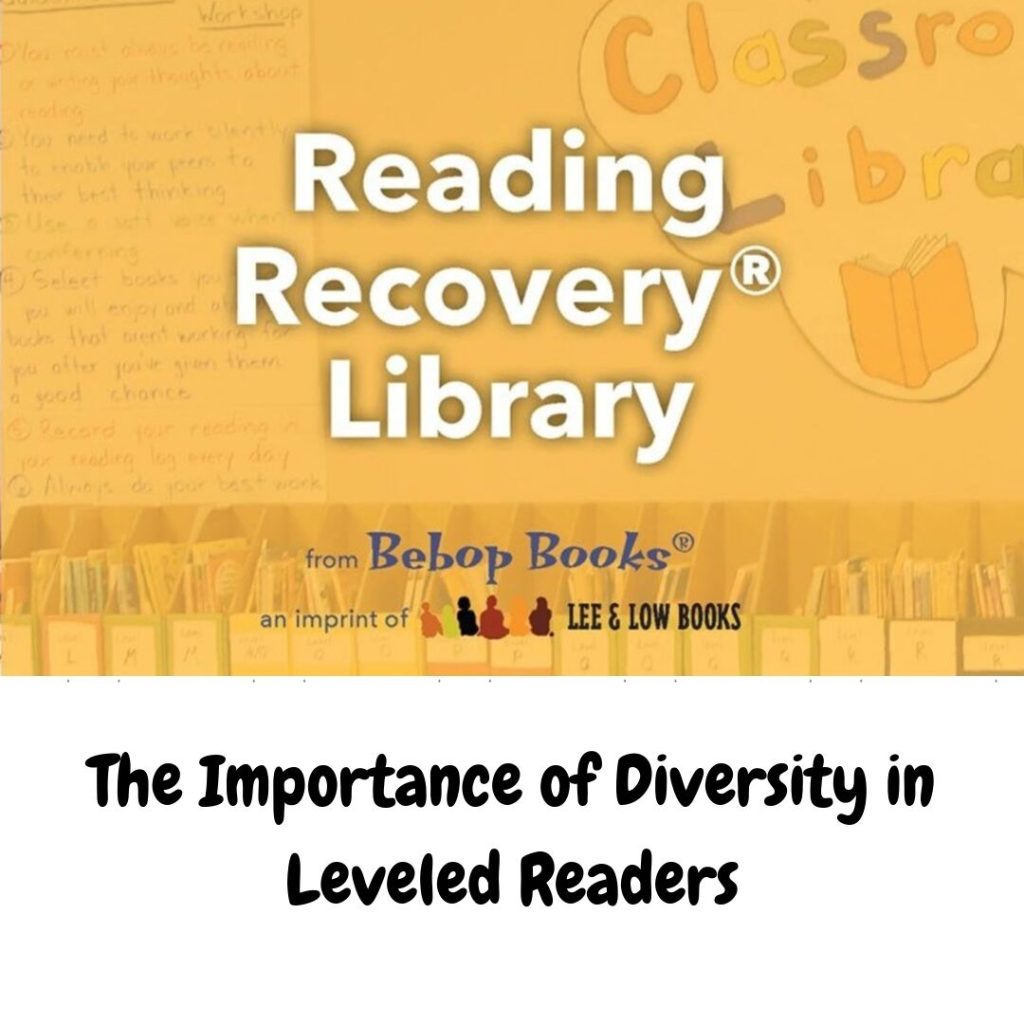In this guest blog post, Dr. Lisa Pinkerton, the Marie Clay Endowed Chair in Reading Recovery® and Early Literacy at The Ohio State University, discusses the importance of expanding diverse stories for young readers in Reading Recovery®.
I have long admired Lee & Low Books and their mission to publish contemporary diverse stories that all children can enjoy. As a Reading Recovery® trainer, imagine my delight to discover that Lee & Low Books is now on the RRCNA booklist!
Reading Recovery® (RR), and in Spanish, Descubriendo la Lectura (DLL), are highly researched and effective short-term literacy interventions for first grade students experiencing extreme difficulty learning to read and write. Specially trained teachers work individually with students in daily 30-minute lessons for 12 to 20 weeks. The goal is to take the lowest achieving children and bring them to their class average of literacy performance. Reading Recovery® was developed by New Zealand educator and researcher, Dr. Marie Clay; the intervention began in the U.S. in 1984 at The Ohio State University.
Our collaboration began in 2017, when Lee & Low Books submitted many of their Bebop Books to Reading Recovery® and Descubriendo la Lectura for leveling. Lee & Low had just begun to publish updated Más Piñata leveled readers, bringing back the first authentic Spanish leveled readers in the U.S. with new English editions. We are very fortunate to be working with Lee & Low, as RR/DLL values diverse stories for all our students.
 Readers need exposure to a wide variety of books; therefore, it is important for RR/DLL teachers to choose books from many different publishers. This ensures that students experience an extensive range of books with a variety of writing styles, authors, illustrators, genres, formats, content, and perspectives. Bebop Books leveled readers help to expand our students’ reading opportunities.
Readers need exposure to a wide variety of books; therefore, it is important for RR/DLL teachers to choose books from many different publishers. This ensures that students experience an extensive range of books with a variety of writing styles, authors, illustrators, genres, formats, content, and perspectives. Bebop Books leveled readers help to expand our students’ reading opportunities.
One of the most prevalent voices regarding diverse perspectives in children’s literature is Dr. Rudine Sims Bishop, Professor Emerita of Education at The Ohio State University. Bishop developed the metaphor of windows and mirrors to help illuminate issues of diversity in children’s literature: “…children need literature that serves as a window onto lives and experiences different from their own and literature that serves as a mirror reflecting themselves and their cultural values, attitudes and behaviors” (Bishop, 1994, p. xiv). According to Bishop, literature is a vehicle through which we transmit our world views; therefore, it carries powerful messages to readers. She views literature as a powerful tool of self-affirmation.
Children from marginalized groups often have very few mirror books available, sending them a damaging message of devaluation by society (Bishop, 1990a). When children cannot find themselves reflected in the books they read, or when the images they see are inauthentic or negative, they learn a powerful lesson of how they are devalued by society. If readers cannot find characters who look like them and experience life in ways that they can relate to in the books they read, then they can feel alone.
Conversely, if children see only reflections of themselves in the books they read, “…they will grow up with an exaggerated view of their importance and value in the world – a dangerous ethnocentrism” (Bishop, 1990b, p. x). Children who are members of dominant groups often have a wealth of mirror books available to them, but without window books, they risk developing a view of the superiority of their own experiences and place in the world. Books may be one of the few places where children who are culturally isolated from the larger world may meet people unlike themselves. Such readers need books that will help them understand the diverse nature of the world they inhabit. This is important for children of all ages, but especially as they begin to read independently.
Bishop asserts that children need literature that will serve as a window onto experiences different than their own, as well as literature that will serve as a mirror to reflect their own lived experiences. And sometimes, when the lighting conditions are just right, a book can act as both a window and a mirror for the reader: “Literature transforms human experience and reflects it back to us, and in that reflection we can see our own lives and experiences as part of the larger human experience” (Bishop, 1990b, p. ix-xi).
The relationship between Lee & Low Books and Reading Recovery®/Descubriendo la Lectura expands the number of diverse window and mirror books available to RR/DLL students. According to Katie Potter, Literacy Specialist at Lee & Low Books: “It is our hope that we can offer universities, libraries, districts, and schools a collection of some of our most beloved leveled readers and share what people love most about Lee & Low now with the Reading Recovery® community: meaningful, exciting stories that reflect and celebrate the diversity in backgrounds and experiences of children in today’s classrooms.”
I am most grateful for Lee & Low’s commitment to helping grow RR/DLL’s collection of diverse stories for the enjoyment of all our readers.
To find the official Reading Recovery® leveled titles from Bebop Books, please check out the collection below:
Reading Recovery® Bebop Books collections
If you would like to build a customized classroom library with Lee & Low, please contact RR@leeandlow.com or read our blog post for more information.
References
Bishop, R. S. (1990a). Keynote speech: “Windows and mirrors: Children’s books and parallel cultures.” San Bernardino, CA: California State University, Reading Conference.
Bishop, R. S. (1990b, Summer). Mirrors, windows, and sliding glass doors. Perspectives: Choosing and Using Books for the Classroom, 6(3), ix-xi.
Bishop, R. S. (Ed.). (1994). Kaleidoscope: A multicultural booklist for grades K-8. Urbana, IL: National Council of Teachers of English.
 About the Author: Lisa Pinkerton (Patrick) is the Marie Clay Endowed Chair in Reading Recovery® and Early Literacy at The Ohio State University, where she also works as a trainer for the Reading Recovery® and Literacy Collaborative projects. She currently serves on the NCTE Award for Excellence in Poetry for Children committee, as well as the chair of the Children’s Literature Strand Committee for the National Reading Recovery® & K-6 Literacy Conference. An avid reader, Lisa earned her PhD in Literature for Children and Young Adults at The Ohio State University. Lisa can usually be found putting books in the hands of students and teachers.
About the Author: Lisa Pinkerton (Patrick) is the Marie Clay Endowed Chair in Reading Recovery® and Early Literacy at The Ohio State University, where she also works as a trainer for the Reading Recovery® and Literacy Collaborative projects. She currently serves on the NCTE Award for Excellence in Poetry for Children committee, as well as the chair of the Children’s Literature Strand Committee for the National Reading Recovery® & K-6 Literacy Conference. An avid reader, Lisa earned her PhD in Literature for Children and Young Adults at The Ohio State University. Lisa can usually be found putting books in the hands of students and teachers.









